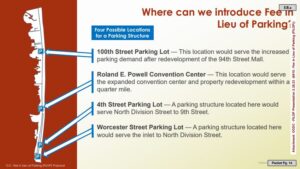
OCEAN CITY – A new parking committee will explore a fee-in-lieu-of-parking concept for Ocean City.
On Tuesday, Ocean City Development Corporation (OCDC) representatives Joe Wilson and Dennis Dare came before the council to discuss the proposed implementation of a fee-in-lieu-of-parking (FILOP) program. In an effort to address parking programs downtown and throughout the resort, Wilson said OCDC was seeking the creation of a parking committee to explore a FILOP program and its application in Ocean City.
“We’re here to introduce and start a discussion on the idea of implementing a fee-in-lieu-of-parking program here in Ocean City,” he said. “I want to emphasize we are not here to provide all the answers. We have begun exploration of the topic, and OCDC board has provided unanimous support for the town to form a parking committee to explore it further.”
Simply put, a FILOP program would allow developers an alternative for meeting the town’s minimum parking requirements. The concept allows property owners to pay a fee to the town instead of providing some or all of the necessary off-street parking required by code. The town then uses those fees to pay for public parking.
Wilson told councilmembers this week that OCDC had hired Walker Consultants to explore a FILOP concept. The study, he said, proposed several options for implementing and managing the program.
“What we’ve learned is there is no one-size-fits-all approach to a fee-in-lieu program …,” he said. “Ultimately, we recommend the parking committee be the body that irons out the nitty gritty in regard to the program.”
Wilson said several events spurred the nonprofit’s exploration of a FILOP program. He noted that one project proposed for the OCDC model block did not have enough parking space.
“Ultimately the project would’ve required some sort of off-site parking in order to maximize the potential of the site, which is not a readily available option today,” he said.
He argued a fee-in-lieu program would not only encourage redevelopment downtown but would address nonconformities.
“A fee-in-lieu-of-parking program would help reduce parking stress that the town is adding on a continual basis by providing for centralized parking in certain areas of town,” he said.
Utilizing a parking garage or surface parking, officials say a FILOP program would address parking problems, encourage infill development and increase walkability in the downtown area.
“The Inlet parking lot is increasingly being used as an events and fairgrounds venue, oftentimes displacing the largest source of parking in the downtown area,” Wilson added. “Having available parking to host events for upwards of 40,000 attendees will require additional sources of parking.”
Officials say OCDC is joined by the Ocean City Hotel-Motel-Restaurant Association in advocating for the development of parking garages both downtown and at the convention center. Dare noted a parking structure could also be constructed in the area of 100th Street, where there’s increased parking demand.
“While we’re concentrating on the downtown at Worcester Street and 4th Street, we’re also showing some examples of how this program could help throughout town,” he said.
Dare told council members this week exploration of a FILOP program first began in 1994, when officials presented a FILOP program and proposed ordinance. And in 2005, the town sought engineering proposals that included a study of a fee-in-lieu concept.
“It just never seems to have been followed through with,” he said.
Should the concept be approved, Dare said the Mayor and Council would need to determine how the program would be managed. He noted the town could establish a parking authority or create a new department.
“That’s something the committee can bring back to you with more detail,” he said.
Wilson said a FILOP program could begin immediately by using existing surface lots. Funds collected from the program could then be used to support a future parking structure.
“The idea is you put the program in place to secure the source of funding,” he said. “And if the demand is there, you can build a garage down the road.”
Wilson noted cost estimates for FILOP parking structures were included in the Walker Consultants study, which has been posted on the OCDC website. Estimates for an above-grade parking structure totaled $50,300 in upfront costs per space and $890 in annual costs per space, while estimates for an above-grade parking structure with a rooftop amenity level totaled $58,800 in upfront costs per space and $920 in annual costs per space. Estimates for surface parking totaled $67,500 in upfront costs per space and $150 in annual costs per space.
“It’s important to mention that fee-in-lieu should provide an avenue that is less expensive than it would cost the developer to go out and purchase land on their own or construct something on their own, in order to create a development incentive,” he said.
After further discussion, the council voted unanimously to form a parking committee for the exploration of a FILOP program and to recruit committee members, which could include the city manager, city engineer, public works director and OCDC representatives.

